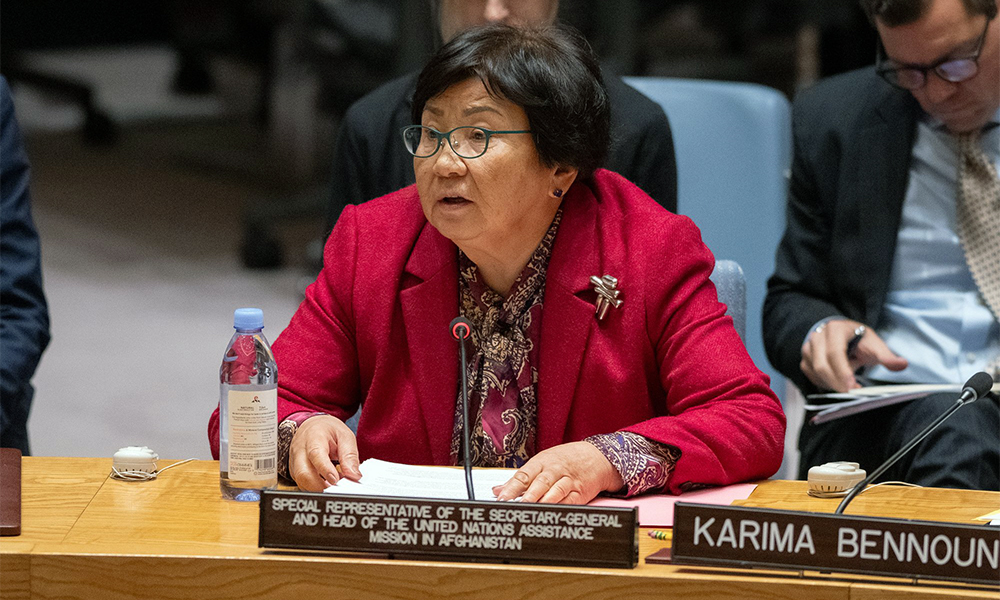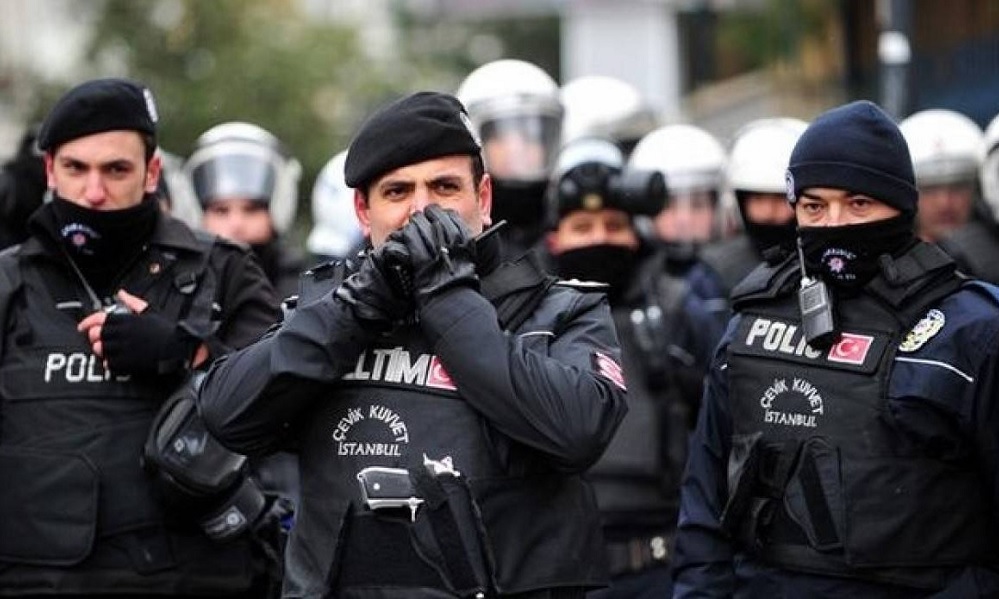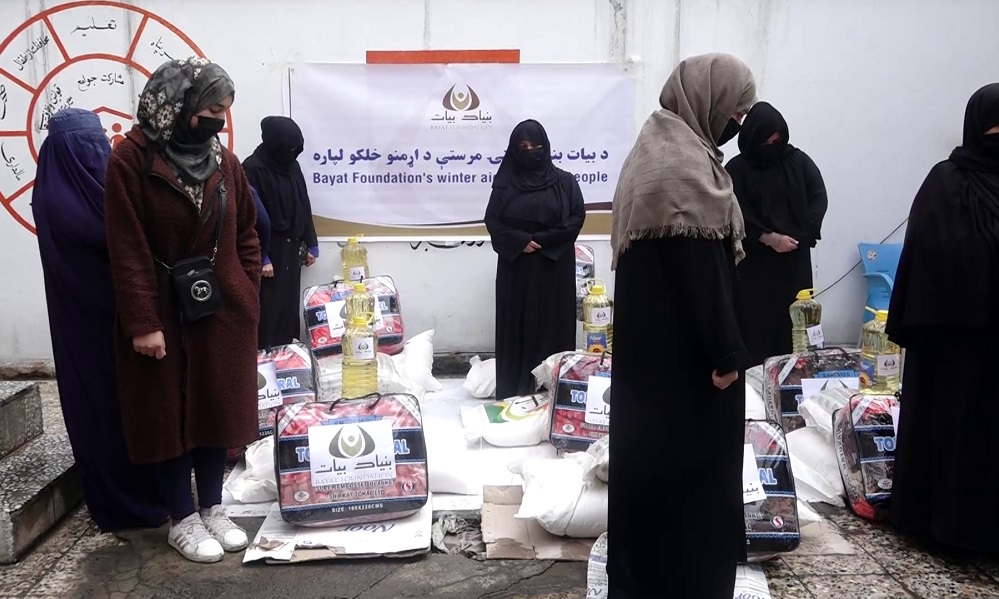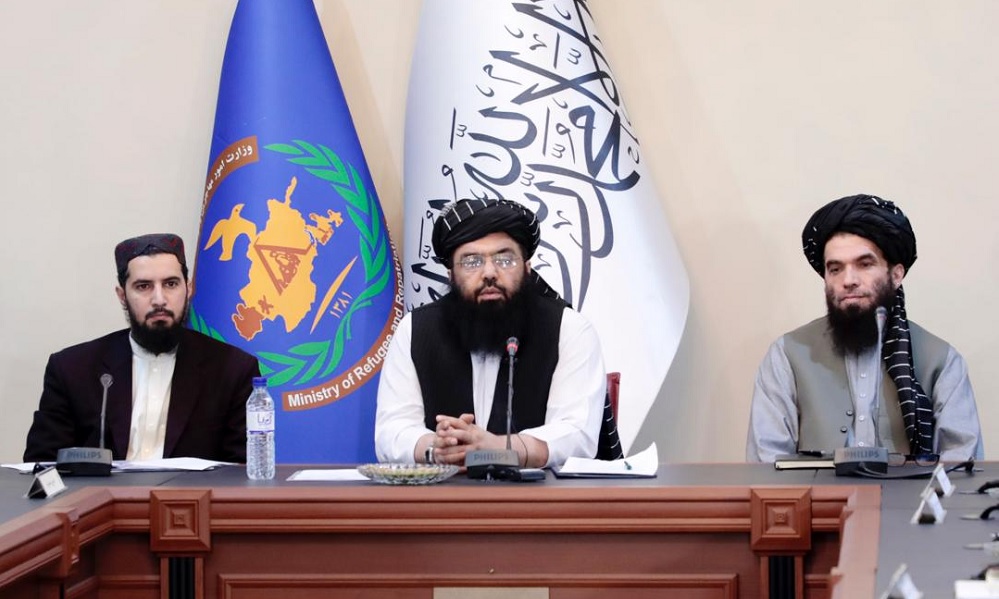Latest News
Engagement key to reform of IEA policies restricting women’s rights

The international community must continue to engage with Islamic Emirate leaders in Afghanistan despite deep disagreement with their approach to women’s rights and inclusive governance, the UN Special Representative for the country told the Security Council on Tuesday.
Roza Otunbayeva, who also heads the UN Assistance Mission in Afghanistan (UNAMA), called for a “reframed engagement strategy”, expressing concern over the “lack of positive direction” in current efforts.
“The lack of trust on all sides is a serious impediment to building confidence but the doors to dialogue are still open,” she said.
“This moment, despite its problems, is an opportunity. We must ensure that the doors to dialogue are not shut.”
Otunbayeva said engagement has been significantly undermined by the more than 50 Taliban decrees aimed at eliminating women from public life and education.
“The policies that drive the exclusion of women are unacceptable to the international community,” she said.
She also cited a new UN report based on more than 500 interviews with Afghan women, 46 percent of whom said the Islamic Emirate should not be recognized under any circumstances.
“The question, however, is whether to continue engaging with the de facto authorities despite these policies, or to cease engaging because of them,” she said.
“UNAMA’s view is that we must continue to engage and to maintain a dialogue.
“Dialogue is not recognition. Engagement is not acceptance of these policies. On the contrary: dialogue and engagement are how we are attempting to change these policies.”
Otunbayeza told the Council that this engagement could be more structured and purposeful while remaining principled.
“A reframed engagement strategy must first acknowledge that the de facto authority bears responsibility for the well-being of the Afghan people, in all dimensions but especially concerning women,” she stressed.
Other components would include mechanisms to address the de facto authorities’ long-term concerns, as well as “a sincere intra-Afghan dialogue of the sort that was interrupted when the Taliban took power in August 2021.”
Additionally, “a more coherent position of the international community” would also be required, she said.
Sima Bahous, head of the UN’s gender equality agency, UN Women, also briefed the Council. She told ambassadors that Taliban decrees are costing Afghanistan roughly one billion dollars a year, which will only increase.
The edicts are also exacerbating the dire humanitarian situation in a country where more than two-thirds of the population depend on assistance to survive and some 20 million, mainly women and girls, are facing acute hunger.
She insisted that the way forward must be guided by women’s voices and the principles of the UN Charter.
Bahous recommended that the Security Council Committee that oversees sanctions against Afghanistan convene a session to examine the role it can play in responding to violations of women’s rights in the country.
“We must consider the messages we send when we frame the situation in Afghanistan purely or exclusively as a humanitarian crisis,” she further advised.
“It is an economic crisis, a mental health crisis, a development crisis, and more. And the thread that connects these different facets is the underlying women’s rights crisis. This must be the primary lens through which we understand what is going on and what we must do.”
She also urged ambassadors to fully support efforts to explicitly codify “gender apartheid” in international law.
Latest News
Turkish intelligence captures a Daesh member near the Durand Line

Turkish intelligence agents have captured a senior member of Daesh near the Durand Line, reportedly preventing planned suicide attacks in Turkey and other countries, according to Turkey’s state-run Anadolu Agency on Monday.
The suspect, identified as Mehmet Goren, is a Turkish citizen. He was apprehended during a covert operation and transferred to Turkey. Details on the timing of the operation or the involvement of Afghan and Pakistani authorities were not disclosed.
According to the report, Goren had risen through the ranks of Daesh and was allegedly tasked with carrying out suicide bombings in Turkey, Pakistan, Afghanistan, and Europe.
Daesh has a history of deadly attacks in Turkey, including the January 1, 2017 shooting at an Istanbul nightclub that killed 39 people.
Anadolu Agency reported that Goren’s arrest also provided intelligence on the group’s recruitment strategies and planned activities.
Latest News
Dozens of needy families in Kabul receive winter aid from Bayat Foundation

Dozens of needy families in Kabul’s fifth district have received essential winter assistance from the Bayat Foundation, as part of ongoing efforts to ease hardship during the cold season and worsening economic conditions.
According to foundation officials, the aid package includes staple food items such as flour, rice, and cooking oil, along with warm blankets to help families cope with freezing temperatures. Haji Mohammad Ismail, Deputy Head of Bayat Foundation, said the distribution began in Kabul and will soon be expanded to other provinces.
“Our assistance includes flour, rice, cooking oil, and blankets,” Ismail said. “Today, we started distributing these items in Kabul’s fifth district, and God willing, the aid will reach other provinces in the near future.”
Afghanistan continues to face widespread poverty, unemployment, and food insecurity, with many families struggling to meet basic needs, particularly during winter when access to work and heating becomes more difficult.Humanitarian organizations and charitable foundations have stepped up relief efforts to support those most affected.
Beneficiaries welcomed the assistance, describing it as a lifeline. “May God bless you for helping the poor. We had nothing and no work,” said one recipient. Another added, “Thank you for your help. Our flour was almost finished.”
Bayat Foundation officials stressed that winter aid distributions will continue in Kabul and other provinces in the coming days, as part of their broader commitment to supporting needy families across the country.
Latest News
Nearly seven million Afghan refugees return home since Islamic Emirate’s takeover

Since the Islamic Emirate came to power, approximately 6.8 million Afghans have returned home, either voluntarily or forcibly, from neighboring countries and other nations, according to the Minister of Refugees and Repatriation.
Mawlawi Abdul Kabir, speaking at a meeting on finalizing a draft plan for a permanent migration solution in Afghanistan, added that 1.3 million Afghans have been internally displaced due to natural disasters during the same period.
With winter approaching, widespread poverty and severe cold are threatening thousands of lives. Meanwhile, the forced expulsion of Afghan migrants from neighboring countries, particularly Iran and Pakistan, continues.
The Islamic Emirate has repeatedly urged neighboring states to allow migrants to return voluntarily. According to UNHCR, over two million Afghans have returned from Iran and Pakistan since the start of 2025.
-

 Latest News3 days ago
Latest News3 days agoAfghan border forces prevent illegal entry of hundreds into Iran
-

 Latest News3 days ago
Latest News3 days agoPakistan summons Afghan diplomat over deadly attack in North Waziristan
-

 Latest News2 days ago
Latest News2 days agoAfghan health minister calls for medical cooperation between Kabul and New Delhi
-

 Latest News1 day ago
Latest News1 day agoAfghanistan signs 30-year deal for marble mining in Daikundi
-

 Latest News3 days ago
Latest News3 days agoJapan allocates nearly $20 million in humanitarian aid for Afghanistan
-

 Latest News3 days ago
Latest News3 days agoKarzai urges reopening of girls’ schools and universities for Afghanistan’s bright future
-

 Health5 days ago
Health5 days agoAfghanistan seeks India’s support in standardizing traditional medicine
-

 World5 days ago
World5 days agoUS readies new Russia sanctions if Putin rejects peace deal, Bloomberg News reports
























